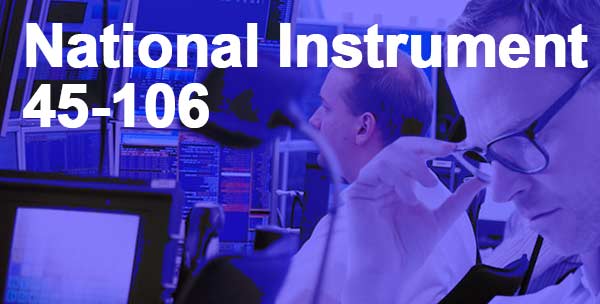
Any security that is going to be distributed to the general public in Ontario Canada is required to be distributed in accordance with a prospectus, as this is the general rule under Ontario securities law. A company or fund may be able to raise capital with the assistance of prospectus exemptions, which frees them from the need to spend time and money preparing a prospectus. There is the possibility of obtaining an exemption for both foreign and domestic companies, as well as hedge or pooled funds.
In the exempt market, exemptions can be utilised on a prospectus to facilitate the sale of various types of securities. Certain investor safeguards do not come into play in the event that a prospectus is not provided alongside the sale of securities. On the other hand, certain exempt distributions may be made on the basis of a certain form of offering document that will subject the distributer to liability in accordance with section 130.1 of Ontario's Securities Act.
The Ontario Securities Commission's Prospectus Exempt Market Report provides an overview of key capital raising products that are sold in Ontario under the exemption that does not require a prospectus. In some instances, in order for a security to be resold after being purchased under this exemption, certain conditions need to be satisfied first. See National Instrument 45-102 Resale of Securities for further details on the restrictions placed on the resale of securities.
The information regarding exempt distribution has been compiled from the respective Reports of Exempt Distribution (Form 45-106F1) that have been submitted to the Ontario Securities Commission (OSC). The approval of the OSC is required for the summary.
When making exempt distributions in accordance with NI 45-110, Form 45-106F1 must be filed electronically. It is essential to check that the correct filing deadline has been established for each exempt distribution. The option to submit an annual Form 45-105F1 is available to investment funds that rely on certain exemptions from the requirement to provide a prospectus.
It is possible that businesses that distribute securities using multiple exemptions from the need to submit a prospectus would prefer to file only one Form 45-106F1. When there are multiple due dates for filing reports of exempt distributions, the report must be submitted on or before the earliest due date (that is, no later than 10 days not 30 days).

Form 45-106F1 must be submitted to the Securities and Exchange Commission by all businesses that sell securities while relying on one of the exemptions from the requirement to include a prospectus in their offering (OSEC). In addition to that, these businesses are required to deliver either offering materials or ongoing disclosure documents, or both. In addition to this, the OSC mandates that all businesses provide annual audited financial statements.
Securities that are considered to be exempt market securities are securities that have been issued in Canada and that are regulated by National Instrument 45-106. They don't need to disclose as much information as a prospectus offering does because they don't have to comply with prospectus requirements. Exempt market securities, in contrast to publicly traded companies, are exempt from the obligation to provide continuous disclosure to investors.
Depending on the exemption that was relied on, exempt market securities might have detailed disclosure or they might not. In general, a prospectus is required to be provided alongside any securities that are put up for sale to the general public in Ontario. These kinds of exemptions from the rule are referred to as prospectus exemptions, and they permit securities to be sold without the use of a prospectus in certain circumstances.
Prospectus exemptions make it possible for businesses to raise capital without incurring the time and cost of preparing and filing a prospectus. One would refer to this as a tax-exempt distribution. At the very least once a year, funds are required to distribute any capital gains to their shareholders. Some businesses provide shareholders with the opportunity to reinvest their dividends (DRIPs).
A person or company is considered to be a dealer in securities if they are registered as such with the securities regulator in the province or territory in which they conduct business. Someone who manages your collection of investments is referred to as a portfolio manager. Before they are allowed to legally sell securities or offer investment advice, they are required to first obtain registration. Discover more about the different types of registration.
In most cases, exempt securities cannot be resold unless particular requirements are first satisfied. The sale of securities without a prospectus does not exempt sellers from the need to register with the appropriate authorities. AreTheyRegistered.ca is the website you should visit if an individual tries to sell you an investment while simultaneously claiming that they are exempt from registration requirements.
The term 'exempt market' refers to investments that are sold without the use of a prospectus and are typically done so by private businesses. If you are eligible under one of the many prospectus exemptions, you will be able to invest in the exempt market in Canada. In most cases, exempt markets are not qualified to be listed on a stock exchange, and they also have restricted access to secondary markets.
Both the public stock exchanges and the Exempt Market have primary markets where they sell new issues or new investments. These primary markets are shared by both markets. Before you make any kind of investment, it is highly suggested that you have a Registered Financial Advisor or another kind of professional, such as a Securities Lawyer, take a careful look at the offer and report back to you on their findings.
The exempt market is a significant source of funding for Alberta businesses and individuals who are just starting out in business. When issuing securities, exempt companies do so in accordance with the provisions of exemptions from the requirement under securities law to file a prospectus. Investors who are able to satisfy the requirements for participating in the exempt market have access to a variety of unique investment opportunities.
Companies in Alberta's exempt market have the ability to bypass the prospectus requirement, which enables them to more quickly raise capital. The cost for businesses is that they must comply with more stringent guidelines regarding who can invest in their businesses. When it comes to the distribution of securities, an issuer may qualify for exemptions in the majority of the provinces and territories.
It is the responsibility of the company that is issuing the securities to ensure that its investors meet the requirements in order for them to be eligible to purchase shares in the exempt market. If the company has not given you an offering memorandum and you are not an accredited investor, then there is a good chance that the issuer cannot legally sell its securities to you without first giving you a prospectus.
Your desired investment goals might be met by investing in exempt markets, but you should be aware that these opportunities come with significant risks. Exempt market fundraising is utilised by a significant number of early-stage companies. You run the risk of losing a sizeable portion of your investment if you put money into a business that has not yet established itself as profitable.
Research the exempt market thoroughly before getting involved with it in any capacity, just as you would with any other type of security. The exempt market may offer investors opportunities for profitable investments. If you have been given the opportunity to purchase an exempt market security, it is imperative that you verify both your eligibility to do so and the registration of the person or company that has presented you with this opportunity.
Certain types of investments may be sold in the province of Manitoba without the use of a prospectus. These types of investments are known as exempt securities, and they are not open to the public. The purpose of a prospectus is to provide potential investors with the essential information they need to make an educated choice about an investment opportunity. If you don't have it, you might be putting a greater amount of your money at risk.
If an issuer only sells securities to accredited investors, the Securities Act of Manitoba allows the issuer to avoid using a prospectus and instead rely on an exemption from the requirement. This document focuses primarily on the exemption for accredited investors, despite the fact that there are many different kinds of exemptions from prospectus and registration requirements. Continue reading this article to learn more about the Exemption for Accredited Investors.
You are permitted to purchase exempt securities if, according to the regulations of the Canadian Securities Administrators, you are a wealthy enough investor to qualify as an accredited investor. When purchasing exempt securities from companies that are not necessarily listed on the CSE or the Toronto Stock Exchange, purchasers have an obligation to exercise extreme caution.
The Canadian Securities Administrators (CSA) Exempt securities get their name from the fact that the companies that issue them do not have to comply with the regulatory requirement to file a prospectus. A prospectus is a lengthy document that provides an in-depth description of the risks associated with doing business and the company itself. The reduction or elimination of this administrative burden is beneficial to the capital-raising efforts of companies of all sizes.
Instead of going through public markets like the Toronto Stock Exchange, companies and dealers on the exempt market sell exempt securities directly to individual investors through private channels. Because exempt securities are not allowed to trade on the exchanges after they have been issued, it can be difficult to resell them. Investors are not provided with consistent financial reports on a regular basis.
A traditional investment portfolio can benefit from the additional level of diversification provided by certain exempt products that are made available through Axcess Capital Advisors.
The fact that investing in exempt securities comes with a number of potential downsides should not be hidden from potential investors.
A document that must comply with certain regulations and provide information about an investment and the risks that are associated with it is called a prospectus. It is possible for Exempt Market Securities to be sold without the use of a prospectus; in its place, you might receive an Offering Memorandum. In some circles, these transactions are also known as 'private placements' or 'exempt distributions.'